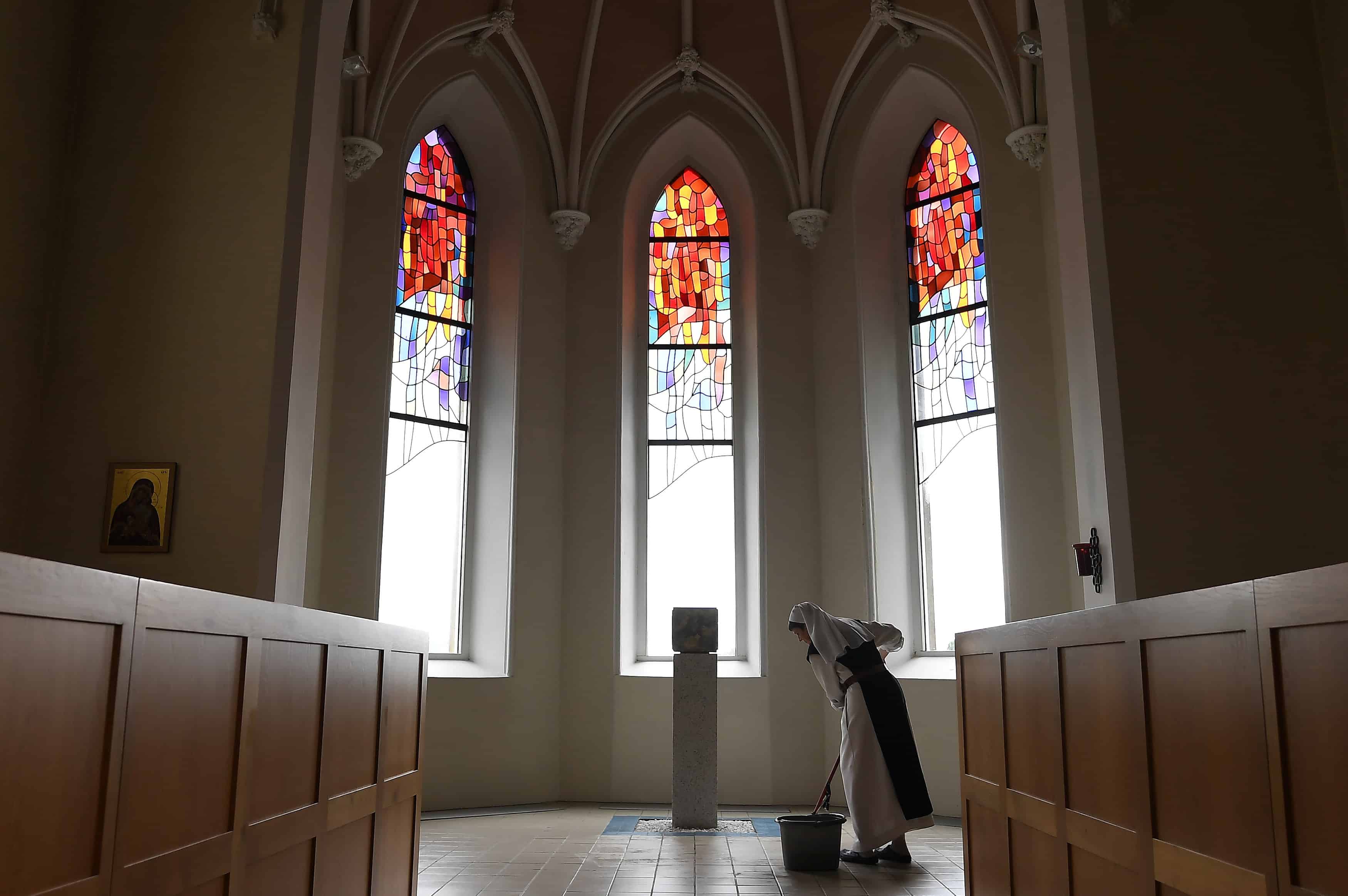As I began reading reports of the Pennsylvania grand jury, two memories stuck out in my head. In the sixth grade (2002), a classmate insultingly called another a “priest.” The other promptly replied, “I ain’t no rapist!” The second memory came as a Jesuit novice. I was using the computer at another community and saw someone had previously searched things like “nubile” and “boys touching.”1
When I read the flow of news articles, tweets, Facebook posts, and commentaries on the Pennsylvania grand jury report, I couldn’t help but throw my hands in the air and marvel at the lack of progress we’ve made. Throughout my life, I turned to my Catholic faith for healing and consolation. I cannot imagine the pain of those who sought similar comfort, but found destruction. And now we’re reliving that pain, driving the spike deeper.
So I’m left wondering – Where do we go from here? What of the proposed solutions? What’s the point of even being a Jesuit? Of being a Catholic?
****
Below are a series of solutions that I’ve seen to both questions of individual crimes and their systematic coverups. These are not comprehensive, but do address much of what I’ve been reading.2
Open the records:
James Martin, S.J. and many others have suggested that diocese, religious orders, schools, etc… need to open their records and admit who has committed and covered up abuse. The St. Louis Archdiocese recently invited the Missouri Attorney General to review their records. This move is a vital step. When I go to the doctor, I tell them all of my injuries. For the Church to heal, we need to know all of our injuries to properly address them. If we do not, we run the risk of later infection. One of the greatest dangers to an individual and to a community is secrecy. We must be open and transparent, or darkness far more easily creeps in.
All bishops resign:
“Why it is time for all U.S. bishops to resign” https://t.co/3hFbbjoGPo
— TIME (@TIME) August 20, 2018
Several tweets I’ve seen have asked, “Why are we so comfortable with Chile’s bishops resigning en masse, but not the American bishops?” Perhaps because of my worries and perhaps because I know some great bishops, the call to offer resignation gave me pause. My worries include things like stability or the power-hungry seeing a vacuum and desperately attempting to ascend the ladder (which itself begs more questions). That being said, over 4,000 faithful have signed a letter urging the bishops to seriously consider offering their resignations. Doing so would demonstrate that the bishops are listening, recognize an element of humility, and are willing to admit fault and brokenness.
Lay oversight panels:
The Catholic laity in the USA has no visible, unified, and institutional representation in the Church. We could learn something from the history of the Zentralkomitees der deutschen Katholiken (ZdK) in Germany @zdkonline
— Massimo Faggioli (@MassimoFaggioli) August 22, 2018
Panels of lay leadership seem one of the best means possible for addressing the crisis. Each level of hierarchy – from parish to pope – necessitates an accompanying lay panel. This panel could be more than Catholic-only. When St. Louis University first opened a medical school, the university chose a Lutheran to lead the college in order to ensure the community’s trust. Perhaps here lies an eccumenical and healing opportunity on many fronts.
Ban gay priests:
Many people have suggested that the Church needs to ban and actively remove gay priests, noting that the vast majority of abuse victims are males. As reported in the John Jay Report, 51% of abuse victims from 1950 to 2002 were between 11 and 14 years old, another 27.3% were between 15 and 17, and 81% of all victims were male. However, correlation is not causation. Sexual abuse is overwhelmingly about power, not sex itself. There are dozens more misconceptions about sexual assault and violence. Calling for a catch-all ban of gay men does a disservice to both the Church and the LGBTQ community. We instead need to ask deeper questions about sexual and mental health, community life, and healthy boundaries.
Ordain married priests:
Celibacy in and of itself does not cause abuse. Moreover, celibacy should absolutely not mean social isolation. When I have meetings with my superiors, the first question is typically “Tell me about your prayer life and relationship with Christ.” The second is “Tell me about your family and your friendships with both Jesuits and lay people.” For me as a Jesuit, I know each of these questions is rooted not just in making sure that I don’t harm someone, but in the deeper love and care of cura personalis. Married persons and celibate priests alike need healthy friendships, mental and spiritual health support, and healthy recreation. As one priest friend states: “You need friends who are close enough to congratulate and love you, but also call you out.”
Ordain women:
These scandals have led to renewed calls for the ordination of women to the priesthood (as evidenced by the comment sections on America and TJP). At the root of these calls are difficult questions about patriarchy, power, and sexuality. First, how can the Church proclaim the teaching on the all-male priesthood in the face of widespread concerns that such an all-male priesthood is a root cause of the scandals? It is a question of power and patriarchy. In terms of national sexual abuse rates of minors, women were the abusers in the cases of 14% of boys and 6% of girls. The other 86% and 94% were men. Second, even if the ordination of women to the priesthood is off the table, how can lay people, and particularly women, be integrated more full into the governance of the Church in ways that would prevent such scandals in the future? While some may suggest women’s ordination is a red herring in this discussion, I would argue that it’s part of a larger psychological, sociological, historical, and theological discussion we need to be having.
Questions I haven’t seen:
In the tweets, America, Crux, NCR, Facebook, and TJP comments I’ve read, I have seen a great deal of sharing and questioning. But I haven’t seen (not to say they don’t exist) a number of questions. We have not done a good job of addressing the Church’s history and present day relationships with native communities, including a painful history of rampant cultural abuse. We need to inquire more deeply about the Church in Asia and Africa. We need to look at other cultural and sociological changes, such as the impact of Baby Boomer culture. I by no means want these questions to deflect – quite the opposite. I mean these questions to deepen our understanding, to get to the very heart of not only what we must do, but who we must become for healing, reconciliation, and God’s love in the world.
****
So what’s the point of staying Catholic?
When I was in middle school, I was regularly bullied to the point of frequently considering suicide. I remember attending Mass as a high school junior at the Ignatian Family Teach-In for Justice. As we sang the hymn “We Are One Body,” I felt an incredible weight lifted from me, a sense of love, belonging, and care. I knew from then on that I must share that love with others. In college, that call to share Christ’s love spurred my discernment toward life as a Jesuit. My vocation is to share that love, healing, and mercy that I encountered through the Eucharist.
That is why I am staying. I stay because there is a fire from the Holy Spirit that cannot be quenched, that demands I love truly and fully so that others may know God’s work in the world. I cannot sit, I cannot abandon because I share that Eucharistic love.
Yet I also know that for many, this was the last straw. I know that the Church and Jesuits – we the popes, cardinals, bishops, priests, deacons, and brothers – have betrayed your hope and trust. In our Jesuit vows, we state that we “know how unworthy [we are] in God’s divine sight.” We are, at this moment, just as unworthy in your sight. I am sorry. Words are not enough, and we must get to work in righting our wrongs. We should have been at this work decades ago. I do not blame those of you who choose to walk away. But please, no matter what, carry with you my sorrow and my commitment to do justice; but more importantly carry the undying love of Christ.
Because I kept silent, my bones wasted away; I groaned all day long. For day and night your hand was heavy upon me; my strength withered as in dry summer heat. Then I declared my sin to you; my guilt I did not hide. I said, “I confess my transgression to the LORD.” – Psalm 32:3-5


